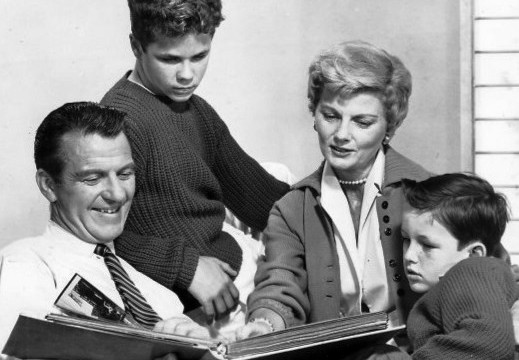As parents, we care deeply about sharing pop culture with our offspring. It’s clearly quite important, especially if we want half our jokes to make sense. And even though Graham and I grew up at least a thousand miles apart (he moved more than I did and has lived in three states), and even though he’s about four years younger than I am, we still do have a lot of cultural reference points in common. I attribute this largely to the fact that we both grew up before infomercials took over.
When we were kids, shows from our parents’ generation still regularly played on TV. M*A*S*H was on after my bedtime, and indeed most of its original run was before I was born, but I’d still seen every episode long before its DVD release, because they played it on channel eleven, as I recall, every weeknight of my entire childhood. One or two episodes. I was nine and had an opinion on the great debates of the series—even then, I preferred the later episodes.
Okay, so not everything I saw was a classic, and that’s not even getting into the whole “I do not, as it happens, love Lucy” thing. You can tell someone my age grew up without TV if they don’t know a lot of details about Gilligan’s Island, because that one was a regular. At some point, one of our stations started playing the Adam West Batman on a regular basis, and that was extremely popular. Heck, Nickelodeon even played The Monkees for a while when I was in fourth grade! Though I’ll defend that one, having rewatched it as an adult and discovered how secretly intelligent it could be.
Weekend afternoons were also a wealth of old movies. Admittedly they weren’t always very good, because what got played most often was things in the public domain, but I was still watching movies my mom had seen as a kid. It gave us a connection. We’d be flipping through the TV listings, reading off what would be on that afternoon, and Mom would say, “Oh, I haven’t seen that one in years.” And there we were—two hours spent with Mom, laughing as a family. Or whatever emotional connection the film raised, anyway.
By the time I was in high school, we had fewer afternoons like that. Yeah, so part of it was the fact that we’d built up a pretty good VHS collection by then, and we might choose to forgo what was on TV for just rewatching Shadow of the Thin Man for the fifteenth time. We’d all gotten very busy, too. There are fewer lazy Saturday afternoons to be had if everyone has plans on Saturday afternoon.
Still, by then, the great pleasures of syndicated TV were fading for everyone. Why spend money on reruns of Rocky and Bullwinkle at seven in the morning, as one of the stations my grandparents got in Arizona did, when you could instead get paid to fill the slot selling things? After all, how much is advertising really worth at that hour in a program that first aired decades ago? Does it even really offset the costs? But if someone will fill that whole slot with programming for you, and pay you for the privilege, there’s no reason not to take advantage of it.
I don’t know. I still think we’re the poorer as a culture for it. I understand the marketing reasons, the logistical reasons, all of that. I just wish the owners of the TV stations were a little committed to keeping that connection with the past alive. Yeah, we can acquire most of the stuff we watched on syndication, but that’s different than allowing our kids to discover things on their own. For one, my mom was too old to have gotten into The Monkees and is not a huge fan of Batman. Or Star Trek, which admittedly I didn’t watch very often as it aired at eleven at night. If I’d been dependent on Mom’s tastes, I would never have seen them.
Is there a contradiction there? Possibly. I’m singing the praises of shared experiences and yet lamenting that my kids won’t have the chance to watch stuff I don’t like. But there’s more to sharing experiences than just liking all the same stuff. There’s knowing that it exists at all. My best friend had to explain to a coworker a few years ago what M*A*S*H even was, because she’d never seen it in syndication. The friend’s coworker was an adult. She’d missed that common cultural experience, because she grew up with infomercials filling that time slot instead.


